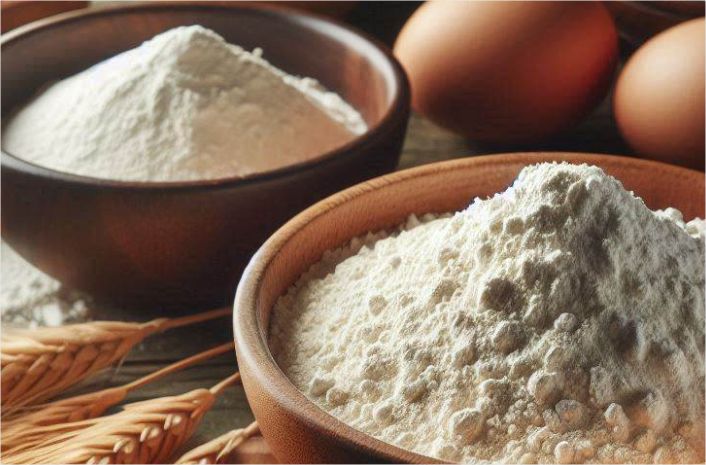Cassava flour vs wheat flour: Discover their key differences in nutrition, uses, and benefits and learn how they match your needs and how to substitute them effectively.
Flour plays a big role in cooking and baking, but not all flours work the same way. If you’re deciding between cassava root flour and wheat flour, the right choice depends on your dietary needs and what you’re making.
Cassava flour is naturally gluten-free, making it a great choice if you have gluten intolerance or celiac disease.
It has a mild flavor and works well in gluten-free baking, thickening sauces, and frying.
Wheat flour, on the other hand, contains gluten, which gives bread and baked goods their structure and chewiness. It’s packed with protein and fiber, making it a go-to for traditional baking and pasta-making.
Want to know which flour is best for your recipe? Let’s break it down.
Related: Cassava Flour vs All-purpose Flour
Overview of Cassava Flour and Wheat Flour
Cassava Flour
Cassava flour is a gluten-free, grain-free flour derived from the whole cassava root, a starchy tuber native to South America and widely cultivated in Africa and Asia.
It is an essential ingredient in many traditional and modern gluten-free recipes.
Production Process
- Peeling – The outer layer, which contains toxins, is removed.
- Washing & Chopping – The root is cleaned and cut into small pieces.
- Drying – Moisture is reduced through sun-drying or machine drying.
- Grinding – The dried pieces are finely milled into cassava flour.
Nutritional Profile (Per 100g)
| Nutrient | Amount |
|---|---|
| Calories | 330 kcal |
| Carbohydrates | 78g |
| Fiber | 3g |
| Protein | 2g |
| Fat | 0.5g |
| Gluten | None |
| Vitamins & Minerals | Small amounts of calcium, potassium, iron |
Uses in Cooking
- Gluten-free baking (bread, cakes, muffins)
- Thickening soups, sauces, and gravies
- Frying for crispy coatings
- Making tortillas and flatbreads
Note: Cassava flour absorbs more liquid than wheat flour, so adjustments are needed when substituting.
Wheat Flour
Wheat flour is a staple ingredient made by grinding wheat grains. It contains gluten, a protein that gives elasticity to dough and helps baked goods rise.
Types of Wheat Flour
| Type of Wheat Flour | Characteristics & Uses |
|---|---|
| All-Purpose Flour | Versatile, used for baking and cooking. |
| Whole Wheat Flour | Higher fiber, includes bran and germ. |
| Bread Flour | High gluten, ideal for chewy bread. |
| Pastry Flour | Lower protein, used for tender pastries. |
| Cake Flour | Ultra-fine, produces soft, light cakes. |
Nutritional Profile (Per 100g)
| Nutrient | Amount |
|---|---|
| Calories | 364 kcal |
| Carbohydrates | 76g |
| Fiber | 2.7g (higher in whole wheat flour) |
| Protein | 10-12g |
| Fat | 1.2g |
| Gluten | Yes |
| Vitamins & Minerals | Iron, B vitamins, magnesium |
Uses in Cooking
- Baking bread, cakes, pastries, and cookies
- Making pasta and noodles
- Thickening soups and sauces
- Coating for fried foods
Both cassava and wheat flour have distinct characteristics, making them suitable for different dietary needs and culinary applications.
Recommended Posts
- Cassava Flour vs Regular Flour
- Cassava Flour vs Tapioca Flour
- Cassava Flour vs Coconut Flour
- Cassava Flour vs Almond Flour
- Places to Purchase Cassava Flour in Bulk
Cassava Flour vs Wheat Flour: Key Differences
| Feature | Cassava Flour | Wheat Flour |
|---|---|---|
| Source | Cassava root | Wheat grain |
| Gluten-Free | Yes | No |
| Texture | Fine, slightly grainy | Fine and powdery |
| Taste | Mild, slightly sweet | Neutral |
| Carbs | High | High |
| Protein | Low | Higher |
| Fiber | Moderate | Higher in whole wheat |
| Glycemic Index | High | Moderate |
| Best Used For | Gluten-free baking, thickening, frying | Bread, pasta, pastries, thickening |
| Absorbs Moisture | More than wheat flour | Standard absorption |
| Elasticity in Baking | Low | High (due to gluten) |
Recommended: Cassava Flour vs Arrowroot
Which Flour is Healthier?
The answer depends on your dietary needs:
- For gluten-free diets: Cassava flour is the better option.
- For higher protein and fiber: Whole wheat flour offers more nutrients.
- For digestive benefits: Cassava flour contains resistant starch, while whole wheat flour provides fiber.
- For blood sugar control: Whole wheat flour has a lower glycemic index than cassava flour.
Related: Can Cassava Flour Be Used for the Keto Diet?
Cooking and Baking Considerations
Substituting Cassava Flour for Wheat Flour
Cassava flour is often used as a 1:1 substitute for wheat flour, but slight modifications may be needed:
- Baked Goods: Increase liquid content to prevent dryness.
- Binding Agents: Add eggs or xanthan gum for elasticity.
- Bread & Yeast-Based Recipes: Mix with another gluten-free flour to improve structure.
When to Choose Wheat Flour
- If you need flour with strong binding properties for bread and pasta.
- If you prefer a flour that works well without modifications.
- If you are not avoiding gluten.
Conclusion
Cassava flour and wheat flour serve different purposes in cooking and baking. Cassava flour is gluten-free, making it ideal for those with celiac disease or gluten intolerance.
It has a mild flavor and works well in many recipes, though adjustments may be necessary.
Wheat flour, especially whole wheat, provides more protein and fiber, making it a nutritious choice for those without gluten restrictions.
Choosing between cassava flour and wheat flour depends on your health goals, dietary restrictions, and the type of dish you are preparing.
Experimenting with both flours can help you discover new textures and flavors that best suit your needs.

Chimeremeze Emeh is a writer and researcher passionate about Africa’s most transformative root crop—cassava. Through his work at cassavavaluechain.com, he explores the entire cassava industry, from cultivation and processing to its diverse applications in food, health, and industrial use.
He also writes for palmoilpalm.com, where he shares his extensive experience and deep-rooted knowledge of palm oil, covering red palm oil, palm kernel oil, and refined products. His work there reflects his lifelong connection to agriculture and his commitment to promoting sustainable value chains in Africa.
Driven by curiosity and purpose, Chimeremeze aims to shed light on how cassava continues to empower communities, strengthen food systems, and link traditional farming wisdom with modern innovation.

